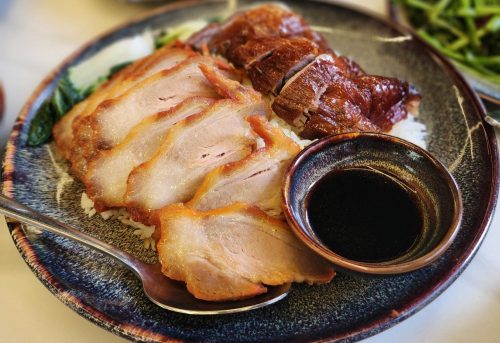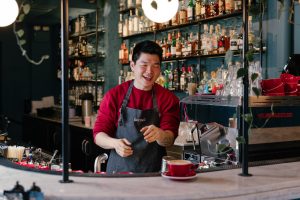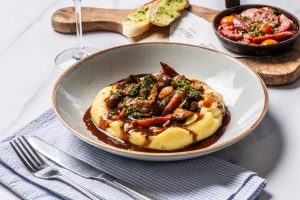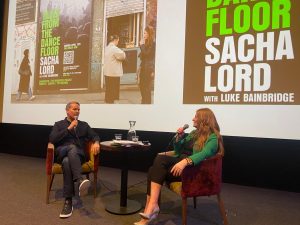Gone Dining with Thom Hetherington at Home (Chinese Manchester)

Home (Chinese Manchester), 16 Chorlton St, Manchester, M1 3HW.
Northern cities have long had an affinity for Chinese food, but the more traditional canteen-style places which proliferated in our Chinatowns didn’t always sit well with an expense-accounting business audience. Overwhelmed extraction could be a killer for those returning to the office, and perfunctory service could be sand in the gears of charming one’s colleagues or sealing a deal with clients.
A significant exception was The Yang Sing in Manchester, which opened in 1977 and offered excellent Cantonese food in refined surroundings with slick service and a decent wine list, but which sadly closed in 2021. Although I have since found solace in casual and sometimes gritty authenticity (Happy Seasons is a regular haunt) I still longed for a bona fide Cantonese restaurant where I could settle in for an extended lunch of work-based schmoozing.
I stress that I needed nothing as wildly ambitious as Pimlico’s A Wong, but I wanted much more than just a glorified cafe.
And lo, here is Home (Chinese Manchester) on Chorlton Street! It occupies a handsome corner unit which had felt like the restaurant equivalent of a weeping angel, as every time I blinked it had changed to a new concept. A Mongolian barbeque *blink* a Greek place *blink* a Lebanese grill. A cursed site then? Nah, to paraphrase Alfred Wainwright, ‘there’s no such thing as a bad location, only an unsuitable operation.’
Home has been launched by first time restaurateur Jason Woo, who has links to the more casual Home Chinese Restaurant in his birthplace of Leeds. Jason lived and worked in London, in data, but like me he felt Manchester lacked a premium Chinese offer, and he couldn’t resist the opportunity to return to his alma mater. Although financial analysis’ loss is hospitality’s gain, at least his SWOT analysis and budget projections should be bang on.
Shimmy up Home’s short flight of stairs and you’re in a smart and well-lit mezzanine room, crisply monochrome yet warm and intimate, with a flood of natural light from the capricious windows and an understated mural of mountains across the back wall. There is a bar with counter seating, and dining for around fifty. There is also a private dining room for fourteen – the holy grail for a business audience – and further covers downstairs.

But how to do justice to the breadth and depth of the menu as it is? You’d need a lazy Susan the size of a railway turntable just to move it around the table. Well, for a start, I invited two lunch companions, rather than the usual one. Lisa Maynard-Atem, the multi-talented Director of The Black United Representation Network CIC, who I know from the Soho House Manchester committee, and her friend Dr Nandita Joshi.

Our helpful waitress guided our choices and patiently explained those dishes which invited questions, making suggestions where appropriate. Overseeing this was an excellent Restaurant Manager, who stalked the room like Piccolino’s proprietorial Ettore. He even stopped by to congratulate us on ordering some of their most traditional dishes, which left me puffed up with pride like a human bao.

The crispy radish dumplings squidged beautifully beneath the most fragile veneer of crust, whilst the king prawn cheung fun featured hench crustacea, curled as tight as fists beneath soft folds of rice noodle. But the star dish was the crispy brown rice cheung fun, scarlet red and packed with prawn and pork. Home was apparently the first UK restaurant to feature this dish, adapted from similar dim sum in South China where brown rice cheung fun has become popular.

The chicken’s feet were also notably good – it was worth the effort persuading our sceptical waitress that a prim-looking English guy would enjoy them, metatarsals and all. They were braised to a melting softness, meaning the skin and meat slipped from the bones like silk socks from a dandy’s ankle, whilst the rough-hewn sauce had the savoury earthiness of fermented soy beans, with mung beans adding crunch.

But Lisa won the day with her dish of cuttlefish cakes; spongy little pucks flecked with chives and spring onion, briefly fried off and piled onto a mix of veg including gai lan, arrowheads of carrot and soft slivers of mushroom. Lisa also insisted on getting fried ‘seaweed’, which in a Proustian moment whizzed me back to the 1980s and my grandad’s birthday parties at Phoenix City, upstairs in Hyde shopping precinct.

The sensitive subject of authenticity and appreciation, when writing about food outside of one’s own cultural upbringing, can sometimes feel like a minefield strewn with cliches. But this obscures the fact that the act of hospitality is at its heart universal, Esperanto for the soul, and should be met only with humble appreciation and respectful curiosity. Home is very much speaking my language.
Petit Fours – Thom Hetherington’s Northern restaurant gossip
Northern restaurant openings continue unabated, with Manchester still seemingly at the epicentre. House of Fu, a firm favourite for me (and my teenage sons) in Leeds, have finally fired up their Manchester site on Portland St, and it’s a stunner. Set over multiple rooms and two floors, it includes a downstairs bar, a PDR, and state-of-the-art karaoke booths. Sexy Fish also opened its gilded doors, with Dame Barbara Cartland décor, the largest champagne list in the North, and a menu of pan-Asian luxe. It has everything turned up to eleven, a hedonistic contrast to the sober John Rylands library extension across the way, and has all the markings of a nailed on winner. Another imminent opening is the new Knutsford location for the produce-led restaurant, wine bar and shop Linden Stores, following their move from Audlem. The owners are Laura Christie, co-founder of Oklava in Shoreditch, and Chris Boustead, who previously worked at London’s Opera Tavern and Ten Bells.
Wigan is a town with a proud history and more train stations than Leeds, and it seems to be turning around after decades of decline. The Heaton Group has a major scheme for a sweep of the city centre periphery, and recently launched Feast at The Mills, which has brought a street food style operation to an appreciative audience. In addition, grand plans and serious funding is in place to ensure Haigh Hall becomes both an engine of civic pride and a cultural destination of international repute. I’m advising them on hospitality, so rest assured we’re aiming high. That said, I’m a man of simple tastes at heart, and was already sold on the town after my last visit when I had a butter pie with gravy from All You Knead and an outstanding pint in The Swan and Railway, recently picked out by the Best Beer guide as one of Greater Manchester’s finest pubs.
An upcoming property project in Salford led to me ferreting around the wide, diverse arc of urbanity beyond Trinity Way. This is possibly one of the most interesting foodie districts of the city, and in an entirely organic way has become home to a slew of Hong Konger restaurants (Sakura and Hong Kong Choi), cafes and supermarkets for Portuguese and Brazilian expats (Meu Portugal and Taste of Portugal), production units for some of the most lauded craft breweries and Deliveroo heroes (Marble Beers and Burgerism), and even an intriguing-looking Romanian restaurant (Locanda’r Grill). Despite such temptations, lunch on this occasion was at the fantastic Maida Grill House, a family run ‘rice n three’ curry café, a concept which I think is unique to greater Manchester? If you end up out that way, maybe to visit Hot Bed Press or Islington Mill, do give it a try.
I was asked to lend my profile to First Table, a new restaurant booking app which gives diners 50% of their food bill for a £6 booking fee. It’s been a huge success in New Zealand and Australia, and is now cracking Manchester, where some of my favourites including Kala and Fire House have already signed up, with Liverpool and Leeds to follow. The neat concept is that the saving only applies to early sittings, so it taps into the age-old restaurant tradition of incentivising diners to visit at the start of service with early bird or pre-theatre offers.
Operators understand the model, as do diners, and no one is tied into memberships or subscriptions. Sounds like a welcome boost for a sector still battered by the after-effects of Covid and rampant inflation, and consumers labouring through the cost of living crisis.









